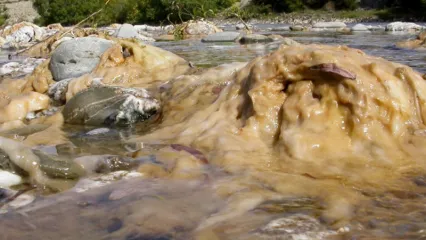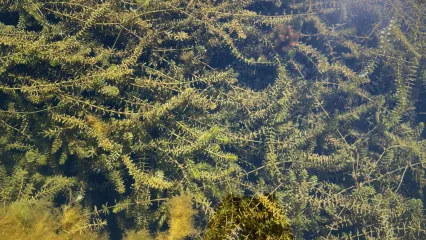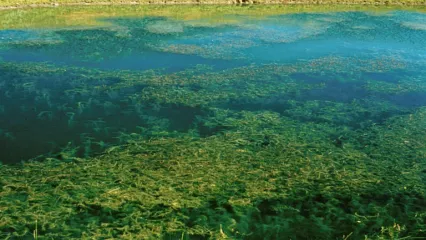
Description
Threat to Streams and Trout Fisheries
“Didymo” or “Rock snot” is a diatom, a form of algae, which is native to the northern hemisphere. Didymo has adapted to a wide range of water quality conditions and has been spreading since the 1980s across America. Near Oklahoma, Didymo has been found in Colorado and the White River in Arkansas. This invasive species attaches to rocks and plants in streambeds and may impact freshwater fish, aquatic plants, and important aquatic insects. Didymo can completely smother rocks and plants and reduce the area of clean substrate on which fish need to spawn and feed. It also tends to outcompete native algal species, many of which are food for aquatic insects, the main diet source of native stream fishes. Didymo mats have become so thick in some areas it became impossible to fish those stream stretches.
Identification Key
- Brown and has a slimy appearance
- Feels like wet wool
- Strongly attached to stones and plants, will not fall off if rubbed
Habitat
Didymo is particularly fond of cold tailwaters which makes trout fisheries in the Lower Illinois and Lower Mountain Fork Rivers ideal habitats for didymo to flourish.
How To Observe
Didymo can be transported on boats, anchors, and fishing gear such as waders, felt-soled boots, and nets. Didymo was found in the Lower Mountain Fork River in 2009.
Anglers who fish streams in the western United States and Arkansas and return to fish the Lower Illinois and/or the Lower Mountain Fork should take precautions to avoid spreading Didymo to state waters.
Anglers need to take the following precautions to avoid spreading Didymo:
Clean. Drain. Dry.
- Before leaving the river, remove all plants and algae from shoes, waders, life vests, boat hulls, trailers
- Treat equipment with a 2% bleach solution or a 5% salt solution or dishwashing detergent
-or-
- Dry equipment for 5 days before fishing a different stream
- Never transfer fish or plants from one body of water to another
- Avoid using felt-soled waders
- Avoid wading through mats of Didymo
If you think you have discovered any invasive species contact us at (918) 200-4815 or report online.


